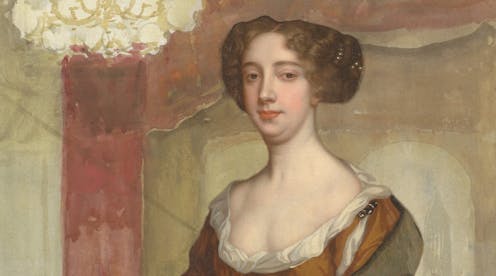
Seventeenth-century writer Aphra Behn (1640-89) made her name in London’s theatre world as the playwright who provided the Duke’s Theatre Company (the theatre company chartered by King Charles II at the start of the Restoration era) with some of its biggest hits. Now her Restoration play, The Amorous Prince, has been rescued from obscurity, after returning to the stage for what appears to be the first performance since 1671.
Most of the published female writers in Behn’s day wrote political pamphlets or religious reflections. There were other female playwrights – such as the Duchess of Newcastle, Margaret Cavendish – but they did not make a living from their work.
The Amorous Prince is a comedy of intrigue about mistaken identity and double-dealing. Its themes become evident a few minutes into the drama, when a courtier warns his princely master against leaving his romantic conquests “quite undone”. Audiences of the time would recognise that the character in question, Curtius, is making a serious accusation: “undone” is here a sexual euphemism. Curtius is urging the prince not to leave his lovers’ sexual reputation destroyed.
His master, Prince Frederick, brushes off the criticism. The conversation further reveals that his current squeeze is Curtius’ own sister (a familial connection the courtier has concealed). Once he is alone, Curtius vows to protect his sister and expose the prince.
Director Natalie Cox of the Canterbury Players brought this long-forgotten play back to the stage for a sold-out three-night run in the Anselm Theatre studio at Canterbury Christ Church University in July. It was important to Cox to use costumes and props that belong in the modern day, rather than the 1670s, so the cast were casually dressed and carried mobile phones.
This creative decision to go for a modernised production removes some of the barriers to audience engagement, making the contemporary resonances clear. The parallels are uncomfortably familiar. Prince Frederick, like a modern-day Harvey Weinstein, gets away with so much because his power is virtually unchecked.
Before the Restoration, female parts were typically performed by young boys, but the monarch Charles II preferred to see women take these roles. So it was by royal edict that the Duke’s Company, and Behn could explore female perspectives on gender politics.
In a short poem attributed to Behn after her death, a lover wearily complains:
Pan, grant that I may never prove
So great a Slave to fall in love,
And to an Unknown Deity
Resign my happy Liberty.
Jilted and lied to, Behn’s women often provide a counterpoint when men like Prince Frederick celebrate the “joys of conquest”. This is libertine behaviour (the sexualised attitude to women popularised at Charles II’s court), seen from the perspective of a female writer, and spoken by a female actor. Just as the poem focuses on the suffering of love, so Behn’s subject matter on stage is often concerned with how easily women have been deceived.
No wonder the most powerful scenes of The Amorous Prince drive home the message that the prince is not only lustful, but dangerous.
The Canterbury Players used an adapted script, based on a modernised version of the play that is free to download. This version was edited by one of us (Elaine Hobby) and anyone is welcome to use the script for any purpose.
While one of the cast of this production noted that the play “lends itself to a contemporary revival very well”, a common theme among the actors we spoke to in rehearsal was that the language takes a little getting used to. Behn’s most famous play is The Rover (1677), a work that has been twice performed at the Royal Shakespeare Company, most recently directed by Loveday Ingram in 2016, which garnered great reviews. Even so, while Behn is widely read, she is rarely performed today.
English Literature courses at universities across the world have firmly established Behn within the literary canon alongside her 17th-century contemporaries such as John Dryden and the earl of Rochester. Recent campaigns to raise the profile of Behn outside of the university sector have included organisations such as A is for Aphra and The Aphra Behn Society of Canterbury.
The popularity of the Canterbury Players’ performance has shown that a female writer from 350 years ago can still be of great interest in today’s world.

Looking for something good? Cut through the noise with a carefully curated selection of the latest releases, live events and exhibitions, straight to your inbox every fortnight, on Fridays. Sign up here.
Elaine Hobby receives funding from the Arts and Humanities Research Council.
Catie Gill receives funding from the AHRC.
This article was originally published on The Conversation. Read the original article.







